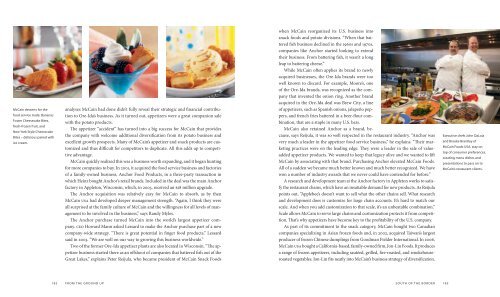From the Ground Up - McCain Foods Limited
From the Ground Up - McCain Foods Limited
From the Ground Up - McCain Foods Limited
Create successful ePaper yourself
Turn your PDF publications into a flip-book with our unique Google optimized e-Paper software.
<strong>McCain</strong> desserts for <strong>the</strong><br />
food service trade: Bananas<br />
Foster Cheesecake Bites,<br />
fresh-frozen fruit, and<br />
New York Style Cheesecake<br />
Bites – delicious paired with<br />
ice cream.<br />
analyses <strong>McCain</strong> had done didn’t fully reveal <strong>the</strong>ir strategic and financial contribution<br />
to Ore-Ida’s business. As it turned out, appetizers were a great companion sale<br />
with <strong>the</strong> potato products.<br />
The appetizer “accident” has turned into a big success for <strong>McCain</strong> that provides<br />
<strong>the</strong> company with welcome additional diversification from its potato business and<br />
excellent growth prospects. Many of <strong>McCain</strong>’s appetizer and snack products are customized<br />
and thus difficult for competitors to duplicate. All this adds up to competitive<br />
advantage.<br />
<strong>McCain</strong> quickly realized this was a business worth expanding, and it began hunting<br />
for more companies to buy. In 2001, it acquired <strong>the</strong> food service business and factories<br />
of a family-owned business, Anchor Food Products, in a three-party transaction in<br />
which Heinz bought Anchor’s retail brands. Included in <strong>the</strong> deal was <strong>the</strong> main Anchor<br />
factory in Appleton, Wisconsin, which, in 2003, received an $18 million upgrade.<br />
The Anchor acquisition was relatively easy for <strong>McCain</strong> to absorb, as by <strong>the</strong>n<br />
<strong>McCain</strong> USA had developed deeper management strength. “Again, I think <strong>the</strong>y were<br />
all surprised at <strong>the</strong> family culture of <strong>McCain</strong> and <strong>the</strong> willingness for all levels of management<br />
to be involved in <strong>the</strong> business,” says Randy Myles.<br />
The Anchor purchase turned <strong>McCain</strong> into <strong>the</strong> world’s largest appetizer company.<br />
CEO Howard Mann asked Lessard to make <strong>the</strong> Anchor purchase part of a new<br />
company-wide strategy. “There is great potential in finger food products,” Lessard<br />
said in 2003. “We are well on our way to growing this business worldwide.”<br />
Two of <strong>the</strong> former Ore-Ida appetizer plants are also located in Wisconsin. “The appetizer<br />
business started <strong>the</strong>re as an offshoot of companies that battered fish out of <strong>the</strong><br />
Great Lakes,” explains Peter Reijula, who became president of <strong>McCain</strong> Snack <strong>Foods</strong><br />
when <strong>McCain</strong> reorganized its U.S. business into<br />
snack foods and potato divisions. “When that battered<br />
fish business declined in <strong>the</strong> 1960s and 1970s,<br />
companies like Anchor started looking to extend<br />
<strong>the</strong>ir business. <strong>From</strong> battering fish, it wasn’t a long<br />
leap to battering cheese.”<br />
While <strong>McCain</strong> often applies its brand to newly<br />
acquired businesses, <strong>the</strong> Ore-Ida brands were too<br />
well known to discard. For example, Moore’s, one<br />
of <strong>the</strong> Ore-Ida brands, was recognized as <strong>the</strong> company<br />
that invented <strong>the</strong> onion ring. Ano<strong>the</strong>r brand<br />
acquired in <strong>the</strong> Ore-Ida deal was Brew City, a line<br />
of appetizers, such as Spanish onions, jalapeño peppers,<br />
and french fries battered in a beer-flour combination,<br />
that are a staple in many U.S. bars.<br />
<strong>McCain</strong> also retained Anchor as a brand, because,<br />
says Reijula, it was so well respected in <strong>the</strong> restaurant industry. “Anchor was<br />
very much a leader in <strong>the</strong> appetizer food service business,” he explains. “Their marketing<br />
practices were on <strong>the</strong> leading edge. They were a leader in <strong>the</strong> sale of valueadded<br />
appetizer products. We wanted to keep that legacy alive and we wanted to lift<br />
<strong>McCain</strong> by associating with that brand. Purchasing Anchor elevated <strong>McCain</strong> <strong>Foods</strong>.<br />
All of a sudden we became much better known and much better recognized. We have<br />
won a number of industry awards that we never could have contended for before.”<br />
A research and development team at <strong>the</strong> Anchor factory in Appleton works to satisfy<br />
<strong>the</strong> restaurant chains, which have an insatiable demand for new products. As Reijula<br />
points out, “Applebee’s doesn’t want to sell what <strong>the</strong> o<strong>the</strong>r chains sell. What research<br />
and development does is customize for large chain accounts. It’s hard to match our<br />
scale. And when you add customization to that scale, it’s an unbeatable combination.”<br />
Scale allows <strong>McCain</strong> to serve large chains and customization protects it from competition.<br />
That’s why appetizers have become key to <strong>the</strong> profitability of <strong>the</strong> U.S. company.<br />
As part of its commitment to <strong>the</strong> snack category, <strong>McCain</strong> bought two Canadian<br />
companies specializing in Asian frozen foods and, in 2002, acquired Taiwan’s largest<br />
producer of frozen Chinese dumplings from Goodman Fielder International. In 2006,<br />
<strong>McCain</strong> USA bought a California-based, family-owned firm, Jon-Lin <strong>Foods</strong>. It produces<br />
a range of frozen appetizers, including sautéed, grilled, fire-roasted, and smokehouseroasted<br />
vegetables. Jon-Lin fits neatly into <strong>McCain</strong>’s business strategy of diversification.<br />
182 f rom <strong>the</strong> <strong>Ground</strong> up<br />
south of <strong>the</strong> border 183<br />
Executive chefs John DaLoia<br />
and Brooke Brantley of<br />
<strong>McCain</strong> <strong>Foods</strong> USA, stay on<br />
top of consumer preferences,<br />
creating menu dishes and<br />
presentations to pass on to<br />
<strong>McCain</strong>’s restaurant clients.






